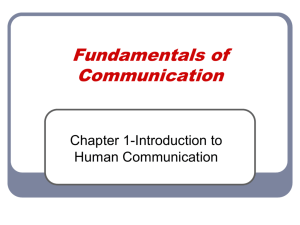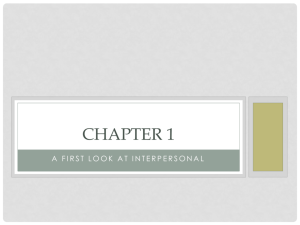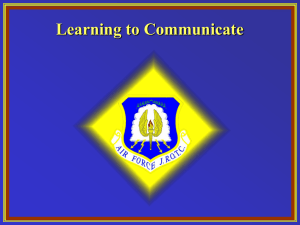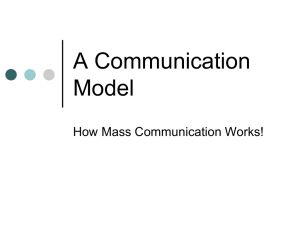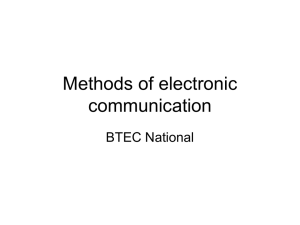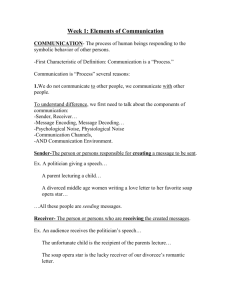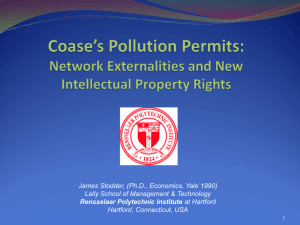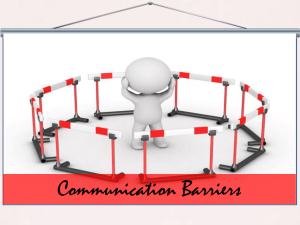The Communication Process
advertisement
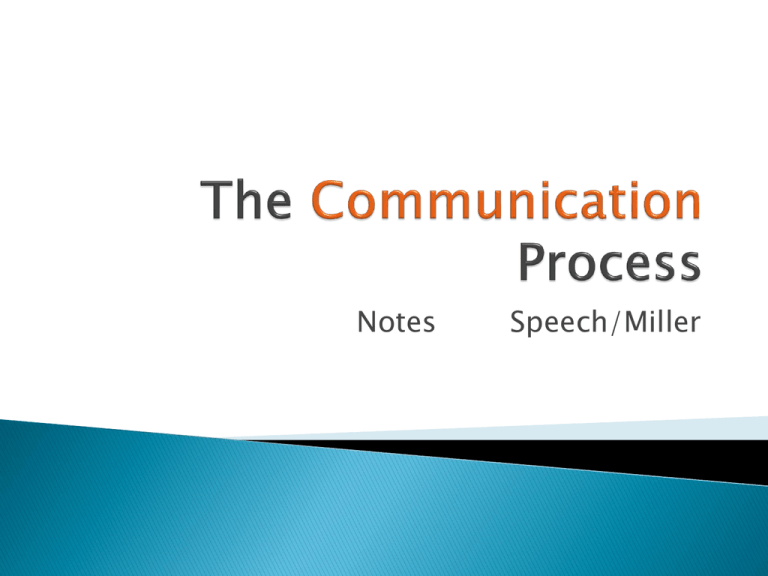
Notes Speech/Miller Context Sender – has to ENCODE the message 1 a : to convert (as a body of information) from one system of communication into another; especially : to convert (a message) into code b : to convey symbolically ◦ (Merriam – Webster online) In other words: has to decide how best to say or share their message The Sender has to encode the MESSAGE. The encoding goes through the FILTERS that belong exclusively to the Sender. ◦ Gender ◦ Age ◦ Religion ◦ Family/ current or past ◦ Education ◦ Attitudes ◦ Physical condition ◦ Experience CONTEXT encoding Sender MESSAGE Symbols – anything that stands for an idea and can be used for communication (letters, texts, emails, memos, drawings, etc.) Verbally – with words Nonverbally – anything other than words ◦ Hand/body gestures ◦ Tone of voice ◦ Silence Receiver has to DECODE the message 1 a : to convert (as a coded message) into intelligible form b : to recognize and interpret 2 a : decipher b : to discover the underlying meaning of The message has to go through the RECEIVER’S filters in order to be decoded. Same TYPES but different and unique to each individual ◦ Gender ◦ Age ◦ Religion ◦ Family/ current or past ◦ Education ◦ Attitudes ◦ Physical condition ◦ Experience CONTEXT channel MESSAGE encoding Sender DECODING Receiver In order to show understanding or LACK of understanding, the Receiver then provides FEEDBACK This is the RETURNING message, encoded through the filters to go back to the original Sender The sender decodes that reply and responds accordingly. Repeat as necessary (it’s a cycle) CONTEXT channel MESSAGE ENCODING DECODING Sender Receiver decoding encoding FEEDBACK channel CONTEXT channel MESSAGE ENCODING DECODING Sender Receiver decoding encoding FEEDBACK channel BARRIERS are obstacles that could get in the way of effective communication Are things the people take in with them: ◦ ◦ ◦ ◦ ◦ Biases Stereotypes Attitude Sickness Weather Education level Social Culture Environment These things do NOT change during course of the communication CONTEXT channel MESSAGE ENCODING Barriers Barriers Sender DECODING decoding Receiver encoding FEEDBACK channel Things that could prevent the message from being clear or easily understood. These things occur DURING the communication. ◦ Physical noise ◦ Semantic noise ◦ Psychological noise Physical Noise: anything heard with the ears that could distract from the message ◦ Clicking pens ◦ Growling stomach ◦ Someone else’s conversation ◦ Ticking clock ◦ Papers rustling ◦ Lawn mower outside ◦ Dog barking Semantic Noise: words used that confuse the listener ◦ Don’t know what the word means (defenestrate) ◦ Don’t appreciate the words used (Now, children) Psychological Noise: anything going on in the Receiver’s OR Sender’s mind that could distract ◦ Hunger ◦ Test next class ◦ hot girl/guy just walked by ◦ Grounded by parents ◦ Argued with teacher last class ◦ Broke up with boy/girl friend ◦ About to sneeze ◦ Discomfort/uncomfortable A= physical B= semantic C= psychological CONTEXT channel MESSAGE ENCODING DECODING B Sender A C decoding Receiver encoding FEEDBACK channel Context Sender Receiver Message Channel Feedback Encoding Decoding Barriers Interference or NOISE Physical, Psychological, Semantic
